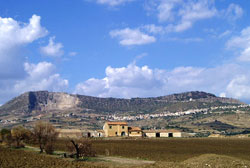Castel di Iudica
Castel di Iudica | |
|---|---|
| Comune di Castel di Judica | |
 | |
| Coordinates: 37°30′N 14°39′E / 37.500°N 14.650°E | |
| Country | Italy |
| Region | Sicily |
| Metropolitan city | Catania (CT) |
| Frazioni | Borgo Franchetto, Carrubbo, Cinquegrana, Giumarra |
| Government | |
| • Mayor | Ruggero Agatino Strano |
| Area | |
• Total | 103.21 km2 (39.85 sq mi) |
| Elevation | 475 m (1,558 ft) |
| Population (31 May 2017)[2] | |
• Total | 4,530 |
| • Density | 44/km2 (110/sq mi) |
| Demonym | Iudicenzi |
| Time zone | UTC+1 (CET) |
| • Summer (DST) | UTC+2 (CEST) |
| Postal code | 95040 |
| Dialing code | 095 |
| Website | Official website |
Castel di Iudica (Sicilian: Castel di Jùdica) is a comune (municipality) in the Metropolitan City of Catania in the Italian region Sicily, located about 130 kilometres (81 mi) southeast of Palermo and about 35 kilometres (22 mi) west of Catania.
Castel di Judica borders the following municipalities: Agira, Catenanuova, Centuripe, Paternò, Ramacca.
History
On the nearby Mount Iudica, there are traces of an ancient settlement (8th-3rd century BC), while on Mount Turcisi are found the remains of a phrourion.
Under Islamic rule, it was called "Zotica" and was home to a castle, which was conquered by Roger I of Sicily around 1076, according to the account of the Norman chronicler Goffredo Malaterra, and was given to the city of Caltagirone. According to Arab geographer al-Idrisi, it was a thriving agricultural village in the early 12th century.
At the mountain's summit, a small church dedicated to Michael the Archangel was built in the 17th century, of which only the bell tower ("Campanaro") remains today.
Between 1816 and 1819, it became a hamlet of the comune of Ramacca under the name Giardinelli. In 1934, it became an autonomous municipality and took its current name in memory of the castle that had stood on Mount Iudica.
Since 2022, the city has been part of the project for the First World Park of Mediterranean Lifestyle along with 103 other cities in central Sicily.[3]
Folklore
A part of the summit of Mount Iudica is known as "u Sautu 'â Vecchia" ("the Jump of the Old Woman"), derived from a legendary episode. During the Norman conquest, it is said that a young woman named Emidia disguised herself as an old woman to deceive the Saracens but was thrown into a ravine by them. However, this act allowed the Normans to conquer the castle.
Since 2005, the episode has been commemorated in an event organized by the municipality and performed at the theater under the title "Angels Over the Sky of Iudica," written and directed by Fabio Cocimano.
External links
References
- ^ "Superficie di Comuni Province e Regioni italiane al 9 ottobre 2011". Italian National Institute of Statistics. Retrieved 16 March 2019.
- ^ All demographics and other statistics: Italian statistical institute Istat.
- ^ "Città di Caltanissetta - Assessorato alla Crescita Territoriale; Patto di Comunità: Primo Parco mondiale, policentrico e diffuso, dello Stile di Vita Mediterraneo - Albo Pretorio: delibera n. 136/2020 del 30/10/2020". Città di Caltanissetta. Retrieved 14 April 2022.



